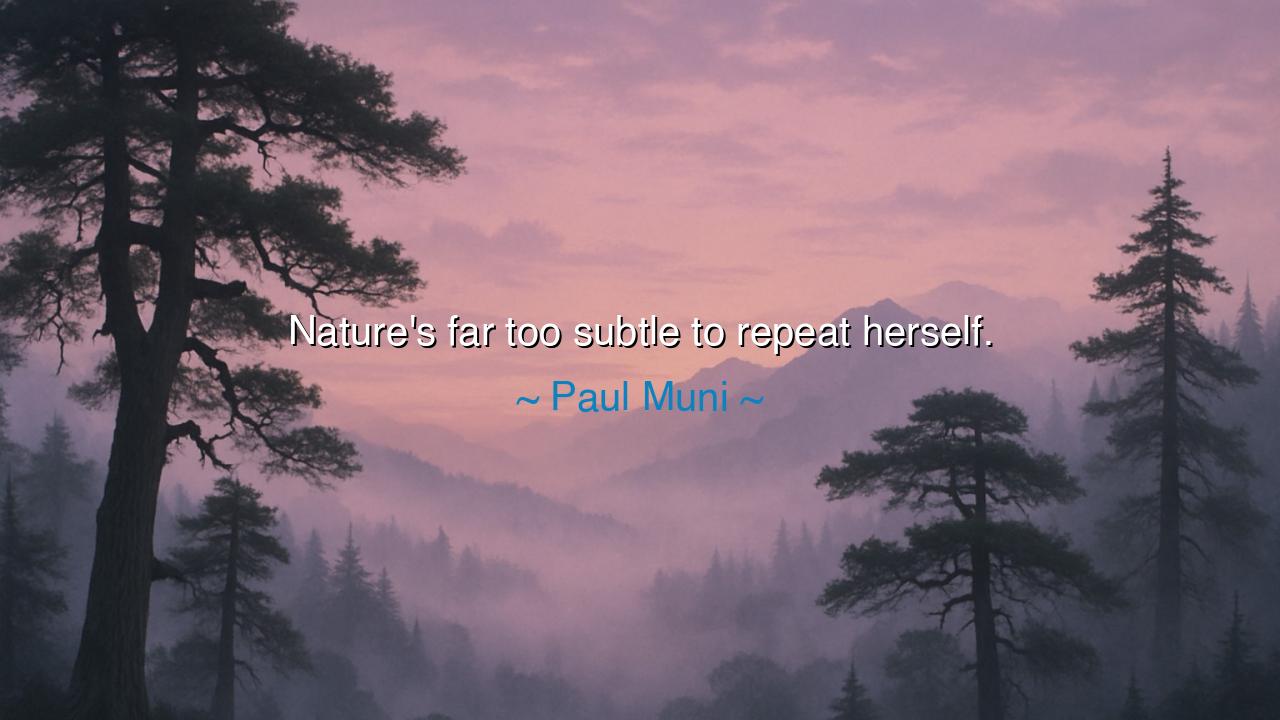
Nature's far too subtle to repeat herself.






Paul Muni once spoke with quiet yet profound insight: “Nature’s far too subtle to repeat herself.” In this saying is hidden not only the wisdom of a man of the stage, but also the eternal voice of the earth itself. For what is Nature but the great weaver of forms, the mother of infinite variety, who delights not in sameness but in endless difference? In her fields, no two leaves are alike; in her heavens, no two stars shine with the same fire. She is subtle, cunning, mysterious, and in her artistry, she scorns repetition.
When Muni, the great actor, uttered these words, he was not speaking only of the forests or the skies. He was speaking of life, of art, of the human spirit. He understood that just as Nature never makes a perfect copy, so too should the artist, the thinker, the soul striving for greatness, never seek to merely repeat what has already been done. To mimic without transformation is to betray the living law of creation. For the spark of life burns most brightly when it takes a new shape, fresh and unexpected, rather than walking forever in the shadows of what was.
Consider the river. Though it flows along the same valley day after day, its waters are never the same. Heraclitus, the ancient philosopher, taught this truth: “No man ever steps in the same river twice.” For both the man and the river are changed. This is the very essence of Nature’s subtlety—she renews, she transforms, she disguises the old in the garments of the new, so that creation never grows stagnant. What is born today will not be born again tomorrow.
History too proves this law. Look upon the reign of Alexander the Great. Many kings after him sought to replicate his conquests, to build empires stretching across the known world. Yet none succeeded as he did. Why? Because Nature had made Alexander but once, with his fiery genius and unyielding will. The world, the time, the man—all converged in a singular harmony that could not be repeated. Those who came after found only shadows of his glory. For Nature’s subtlety does not allow history to write the same tale twice.
But let us not despair at this truth. Instead, let us draw courage from it. If Nature does not repeat herself, then neither should we. Each of us is a singular creation, unrepeatable, distinct in spirit, voice, and destiny. To compare oneself endlessly to others, to imitate without transformation, is to deny the very law of our existence. Instead, let us embrace the uniqueness that Nature has carved into us, and bring forth works, deeds, and lives that are as original as the snowflake and as unrepeatable as the sunrise.
From this wisdom springs a great lesson: do not waste your years trying to live another’s life, nor attempt to re-enact the glories of the past. Cherish the gifts within you that no other possesses. Speak your words, not echoes. Walk your path, not another’s footprints. Like the artist Paul Muni, who transformed himself into countless characters on stage and screen, yet never played them as copies but as living souls, we too must learn to embody originality in whatever role life casts us.
So I say to you: honor the law that Nature’s far too subtle to repeat herself. Let it guide you to cherish your singular place in the great design. In your art, create anew. In your labor, shape with originality. In your life, live as though no other could live it but you—for indeed, no other can. This truth is both a burden and a gift: a burden, because no path is already prepared for you; a gift, because you were born to tread a path that only you can make. And in this lies the heroic beauty of existence.
For just as the stars wheel in endless patterns yet never mirror each other, so too shall we shine, each with a light unrepeatable. Let this truth steady your heart: you are not a copy, nor meant to be one. Live boldly, live uniquely, live as Nature intended—beyond repetition, in the subtlety of the infinite.






AAdministratorAdministrator
Welcome, honored guests. Please leave a comment, we will respond soon